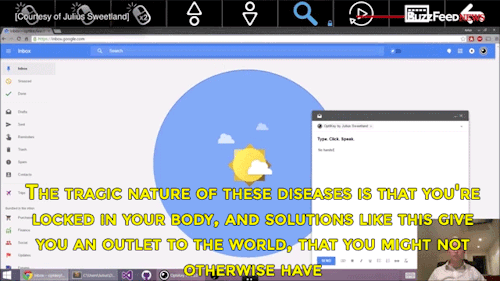Not Measured By Money But By Positive Influence :) Respect.

Not measured by money but by positive influence :) respect.
More Posts from Dotmpotter and Others








Watch the video of this man giving away his software for free to help people with degenerative diseases communicate
This is our demand, our request to all the responsible people – that instead of sending weapons, instead of sending tanks to Afghanistan and all these countries that are suffering from terrorism, send books. Instead of sending tanks, send pens. Instead of sending soldiers, send teachers. This is the only way we can fight for education.
Education activist Malala Yousafzai at today’s #UNGA event on Global Education First.
For more on the event see here.
(via united-nations)





New book on the Halley VI Research Center. Halley VI is a string of 8 modules located on the Brunt Ice Shelf floating on the Weddell Sea in Antarctica. These sexy buildings are built on skis to help them move around. Check out the book, here.
An EPIC View of Earth
“Look again at that dot. That’s here. That’s home. That’s us.”
Carl Sagan wrote those words in his book Pale Blue Dot: A Vision For The Human Future In Space. His now-famous ode to our home planet (listen to the full passage here, in animated form) is perhaps our most poignant and humble reminder of the exquisite beauty and shared fragility of this planet we call home.
NASA is now bringing us a daily reminder of that message, thanks to the EPIC camera (a very appropriately named camera, in my opinion) on board NOAA’s DSCOVR satellite. You can see some of its handiwork in the image sequence above.
DSCOVR’s official space job is to observe weather on and around the sun, to extend its mechanical finger into the solar wind and measure how strongly that stream of charged particles is gusting toward Earth. It does this job from a special spot in space called the L1 Lagrange point. If you were to draw a line between us and the sun, DSCOVR would be sitting along it, like so (not to scale):

That’s a convenient place to put a spacecraft, especially one whose job it is to stare at the sun. See, DSCOVR is nestled inside a pocket where it’s tugged equally by the Earth’s and Sun’s gravity, like a stalemate in an orbital game of tug-o-war. Gravity does all the work, and the spacecraft doesn’t need to maneuver much to stay in position. There’s a few of these gravity-neutral Lagrange points out there, as you can tell in the image above, and we’ve got spacecraft residing at all of them.
As a side effect of its sun-staring mission, DSCOVR’s backside happens to be looking back at Earth full-time. In a way, I think that makes it a different sort of moon.
NASA doesn’t like to let any opportunity go un-scienced, of course, so they decided to slap a camera on DSCOVR’s rear, the one named EPIC, and use their stable perch to keep a regular eye on us. Good lookin’ out, NASA.
A little change in perspective can do a planet good. In 1990, from a vantage point beyond Pluto, Voyager 1 turned its cameras back toward home to take one last look, giving us the image that inspired Carl Sagan’s ode to ol’ Dotty Blue:

This was not an easy shot to take. Voyager’s camera wasn’t the fancy digital type like most of us have in our phones. It was essentially an old-fashioned black and white tube TV in reverse, relying on colored filters held in front of the camera to highlight different wavelengths of light. Voyager stored its image data on magnetic tape, and each of the shots took more than five hours to reach Earth. Sagan and NASA’s planetary science team had to practically move the heavens (since they were unable to move the Earth) in order to take that picture.
Now consider the effect this picture has had. That’s home. That’s us. Even if you weren’t born in 1990, everyone and everything that made you is in and on that hazy blue speck. I hope you never lose sight of how amazing it is to view our planet from this perspective.
Luckily, you can get a reminder every day. The DSCOVR satellite is now sending roughly a picture an hour back to Earth, 24/7/365. That’s a near real-time view of our home. Go take a look. It’s pretty epic.
To see a daily look at what a day on Earth looks like, check out EPIC’s daily updates here.

A good way to remember the human bones in the body. Dope pic
www.learninghumananatomy.com

Did you know that 80% of all terrestrial plants and animals live in forests? That’s why the Global Goals for Sustainable Development, adopted at the United Nations in New York in September, seek to protect forests and biodiversity. Which Global Goal means the most to you? See the full list here: www.un.org/sustainabledevelopment
How To Make Solar Cells Without Toxic Materials

Researchers find non-toxic way to make thin film solar cells…
Follow me on Twitter and Google+.
Image: “A surfactant template guides the self-assembly of functional polymer structures in an aqueous solution” by Youngkyu Han and Renee Manning, via Oak Ridge National Laboratory.

A Smart Menstrual Cup That Tracks Your Period And Makes Sure You’re Healthy http://ift.tt/1Ltl8JD



New 3-D Printer Produces Delicate Soft Objects
A new method of depositing drops of soft materials in a gel could be a new way to print squishy three-dimensional products like living tissue, soft robots and flexible electronics.
In the technique created by University of Florida researchers, a computer-controlled hollow tip precisely embeds fluid droplets of silicone, hydrogel, colloids or living cells inside a granular medium bath the consistency of hand sanitizer. After using the method to make tiny complex soft structures like delicate jellyfish, a tubular knot and a gel version of the nested shapes called Russian dolls, the group says they might have created a new era for engineering.
Keep reading
-
 dotmpotter reblogged this · 11 years ago
dotmpotter reblogged this · 11 years ago -
 lord-canewaxer liked this · 11 years ago
lord-canewaxer liked this · 11 years ago -
 she-writes-she-rhymes-blog1 liked this · 11 years ago
she-writes-she-rhymes-blog1 liked this · 11 years ago -
 28mandown reblogged this · 11 years ago
28mandown reblogged this · 11 years ago -
 spartanfam-blog reblogged this · 11 years ago
spartanfam-blog reblogged this · 11 years ago


